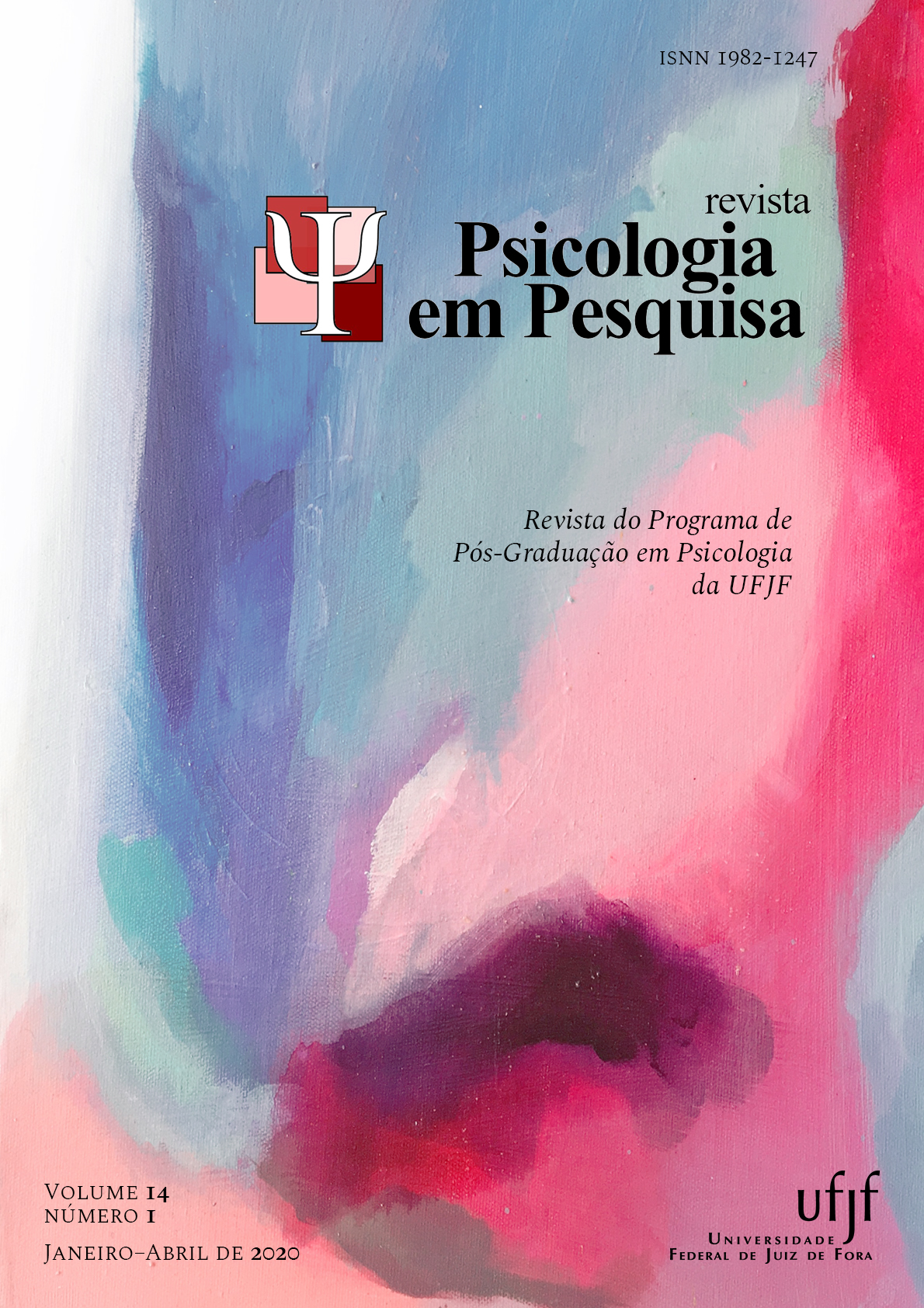Development and validity evidence of the Teaching Practice Perception Scale
DOI:
https://doi.org/10.34019/1982-1247.2020.v14.29037Keywords:
Educational evaluation, Test validity, Teacher attitudes, Educational activity, Teacher-student interactionAbstract
Personalized teaching practices can improve students’ school performance. However, specific instruments to evaluate these practices in the Brazilian context couldn’t be found. The main goal of this study was to construct and present validity evidence for the Teaching Practice Perception Scale (TPPS). Twenty-five items were crated and evaluated by 11 judges. The resulting 17-item scale was applied to 477 teachers via online form. Factorial analyzes identified two dimensions: 'Group' (α = .0,79) reflects group-oriented teaching practices; 'Personalization' (α = 0,88) refers to individual-oriented teaching practices, which explained 48,6% of the total variance. Teachers presented more group than individual-oriented practices.
Downloads
References
Beluce, A. C, & Oliveira, K. L. (2018). Learning Strategies Mediated by Technologies: Use and Observation of Teachers. Paidéia (Ribeirão Preto), 28, e2809. Epub 07 de junho de 2018. https://dx.doi.org/10.1590/1982-4327e2809
Cohen, R. J., Swerdlik, M. E., & Sturman, E. D. (2014). Testagem e Avaliação Psicológica-: Introdução a Testes e Medidas [Psychological Testing and Assessment: An Introduction
to Tests and Measurement]. AMGH Editora.
Ganda, D. R., & Boruchovitch, E.. (2018). A autorregulação da aprendizagem: principais conceitos e modelos teóricos. Psicologia da Educação, (46), 71-80. Recuperado em 06 de setembro de 2019, de http://pepsic.bvsalud.org/scielo.php?script=sci_arttext&pid=S1414-69752018000100008&lng=pt&tlng=pt
Gesser, M., & Martins, R. M. (2019). Contributions of a Teacher Training Program to Inclusive Education. Paidéia (Ribeirão Preto), 29, e2907. https://dx.doi.org/10.1590/1982-4327e2907
Hair, J. F., Black, W. C., Babin, B. J., Anderson, R. E., & Tatham, R. L. (2009). Análise multivariada de dados [Multivariate Data Analysis]. Bookman Editora.
INEP (2016). Brasil no PISA 2015: Análises e reflexões sobre o desempenho dos estudantes brasileiros. São Paulo: Fundação Santillana, 2016. Recuperado de https://goo.gl/naEkpK.
Junges, S. K., & Behrens, M. A. (2016). Uma formação pedagógica inovadora como caminho para a construção de saberes docentes no Ensino Superior [An innovative educational training as a way to build teaching knowledge in Higher Education]. Educar em Revista, (59), 211-229. http://dx.doi.org/10.1590/0104-4060.42282.
Kline, R. (2013). Exploratory and Confirmatory Factor Analysis. In Applied quantitative analysis in education and the social sciences. Routledge.
Morán, J. (2015). Mudando a educação com metodologias ativas. Coleção Mídias Contemporâneas. Convergências Midiáticas, Educação e Cidadania: aproximações jovens, 2, 15-33. Recuperado de: http://rh.unis.edu.br/wp-content/uploads/sites/67/2016/06/Mudando-a-Educacao-com-Metodologias-Ativas.pdf
Ollaik, L. G., & Ziller, H. M. (2012). Concepções de validade em pesquisas qualitativas. Educação e Pesquisa, 38(1), 229-242. https://dx.doi.org/10.1590/S1517-97022012005000002
Pereira, L. O. de A., & Silveira, L. M. de O. B. (2017). Percepção das professoras sobre seus alunos do 5º ano. Psicologia da Educação, (45), 77 86. https://dx.doi.org/10.5935/2175-3520.20170019
Schmitt, D. P. (2015). The evolution of culturally-variable sex differences: Men and women are not always different, but when they are… it appears not to result from patriarchy or sex role socialization. In The evolution of sexuality (pp. 221-256). Springer, Cham. https://dx.doi.org/10.1007/978-3-319-09384-011.
Schulte-Rüther, M., Markowitsch, H. J., Shah, N. J., Fink, G. R., & Piefke, M. (2008). Gender differences in brain networks supporting empathy. Neuroimage, 42(1), 393-403. https://doi.org/10.1016/j.neuroimage.2008.04.180
Silva, F. L., Muzardo, F. T., Suzuki, A. L. S., da Silva, C. E. G., & Santos, D. (2017). Eficácia na sala de aula: autoavaliação de professores de uma escola pública [Effectiveness in the Classroom: Teachers’ Self-evaluation of a Public School]. Revista de Ensino, Educação e Ciências Humanas, 18(3), 239-243. http://dx.doi.org/10.17921/2447-8733.2017v18n3p239-243
Silva, F. L., Muzardo, F. T., Zamariam, J., Santos, F. L. M., Bazante, B., Alves, C. O., ... & Quintiliano, W. P. (2018). Eficácia Docente: Autoavaliação de Professores da Educação Básica [Teacher Effectiveness: Self-Assessment of Elementary School Teachers]. Revista de Ensino, Educação e Ciências Humanas, 19(3), 277-282. http://dx.doi.org/10.17921/2447-8733.2018v19n3p277-282
Tardif, M. Saberes docentes e formação profissional. (9. Ed). Petrópolis: Vozes, 2008.
Tessaro, N. S, & Guzzo, R. S. L. (2004). Auto-avaliação da competência para ensinar: estudo preliminar de uma escala [Self-evaluation of teaching competence: preliminary study from a scale]. Psicologia Escolar e Educacional, 8(2), 157-165. Recuperado de http://pepsic.bvsalud.org/scielo.php?script=sci_arttext&pid=S141385572004000200004&ln=pt&tlng=pt.
van der Lans, R. M., van de Grift, W. J., & Van Veen, K. (2018). Developing an instrument for teacher feedback: using the rasch model to explore teachers' development of effective teaching strategies and behaviors. The journal of experimental education, 86(2), 247-264. https://doi.org/10.1080/00220973.2016.1268086
Warren, C. A. (2014). Towards a pedagogy for the application of empathy in culturally diverse classrooms. The Urban Review, 46(3), 395-419. https://doi.org/10.1007/s11256-013-0262-5
Zimmer-Gembeck, M. J., Chipuer, H. M., Hanisch, M., Creed, P. A., & McGregor, L. (2006). Relationships at school and stage-environment fit as resources for adolescent engagement and achievement. Journal of adolescence, 29(6), 911-933. 10.1016/j.adolescence.2006.04.008















